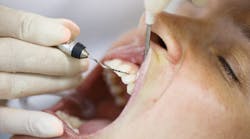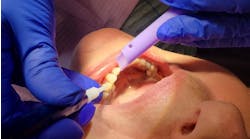Bleeding on probing (BOP) is encountered every day in virtually every dental practice. It is so common that there may be a tendency to undervalue its importance in diagnosing gingivitis and periodontitis. BOP is like periodontitis or pregnancy in the following respects: There is no such thing as “just a little bleeding.” You have it or you don’t. There is no such thing as a little periodontitis; you have it or you don't. There is no such thing as a little pregnant; you are or you are not. You could have BOP or periodontitis of limited distribution, in only a few sites, but you still have it.
Why do the gums bleed upon probing? Because the gingival epithelium lining the sulcus is ulcerated, exposing the capillary beds in the underlying connective tissue. The probe nicks the capillaries when it contacts the ulcerated epithelium, which is denuded … meaning it is gone. An intact gingival epithelium acts as a bacterial and toxin barrier to the systemic circulation.
Is BOP more important perhaps than we realize as it relates to periodontal disease and systemic health? You bet! It constitutes a diagnosis of gingivitis, which is the right time to intervene before full-blown periodontal disease develops. More on this next time.
Richard H. Nagelberg, DDS, has practiced general dentistry in suburban Philadelphia for more than 30 years. He is a speaker, advisory board member, consultant, and key opinion leader for several dental companies and organizations. He lectures on a variety of topics centered on understanding the impact dental professionals have beyond the oral cavity. Contact Dr. Nagelberg at [email protected].For the most current dental headlines, click here.








